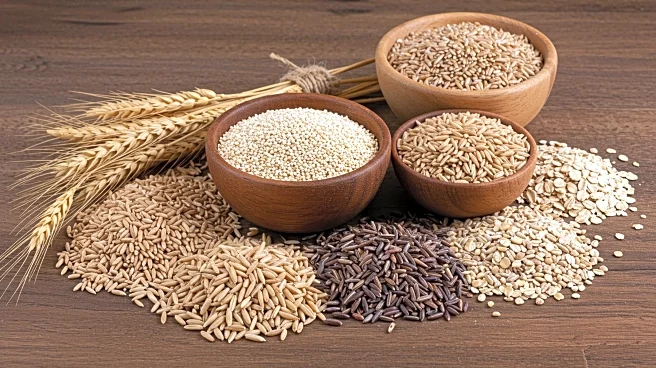What is the story about?
What's Happening?
The Whole Grains Council has been actively promoting the use of whole grains through its Whole Grain Stamp, which has been applied to over 12,000 products in 65 countries. This initiative aims to increase consumer awareness and consumption of whole grains, which offer numerous health benefits such as fiber, vitamins, and antioxidants. Companies like Grupo Bimbo and Flowers Foods are innovating with whole grain products, while Ardent Mills offers whole wheat flour with the taste and texture of white flour. The council's efforts are supported by consumer interest, with 30% of respondents in a 2024 study indicating an increased importance of whole grains in their diet.
Why It's Important?
The promotion of whole grains is significant for public health, as these grains are linked to reduced risks of chronic diseases like type 2 diabetes and improved heart health. The initiative also supports the food industry by encouraging innovation and diversification in product offerings. As consumer demand for healthier options grows, companies that invest in whole grain products may see increased market share and profitability. Additionally, the global reach of the Whole Grain Stamp helps standardize health benefits across different regions, potentially influencing international dietary guidelines.
What's Next?
Manufacturers are expected to continue exploring new markets and developing innovative products that incorporate whole grains. The Whole Grains Council may expand its educational efforts to further increase consumer awareness and demand. Companies might also focus on overcoming challenges related to texture, flavor, and shelf life of whole grain products to enhance consumer acceptance. As the trend towards health-conscious eating grows, more businesses may adopt whole grain ingredients in their offerings.
Beyond the Headlines
The push for whole grains reflects broader trends in the food industry towards sustainability and health. Whole grains are often associated with natural and plant-based ingredients, aligning with consumer preferences for environmentally friendly and ethical food choices. This movement may also influence agricultural practices, encouraging the cultivation of diverse grain varieties and supporting biodiversity.
















